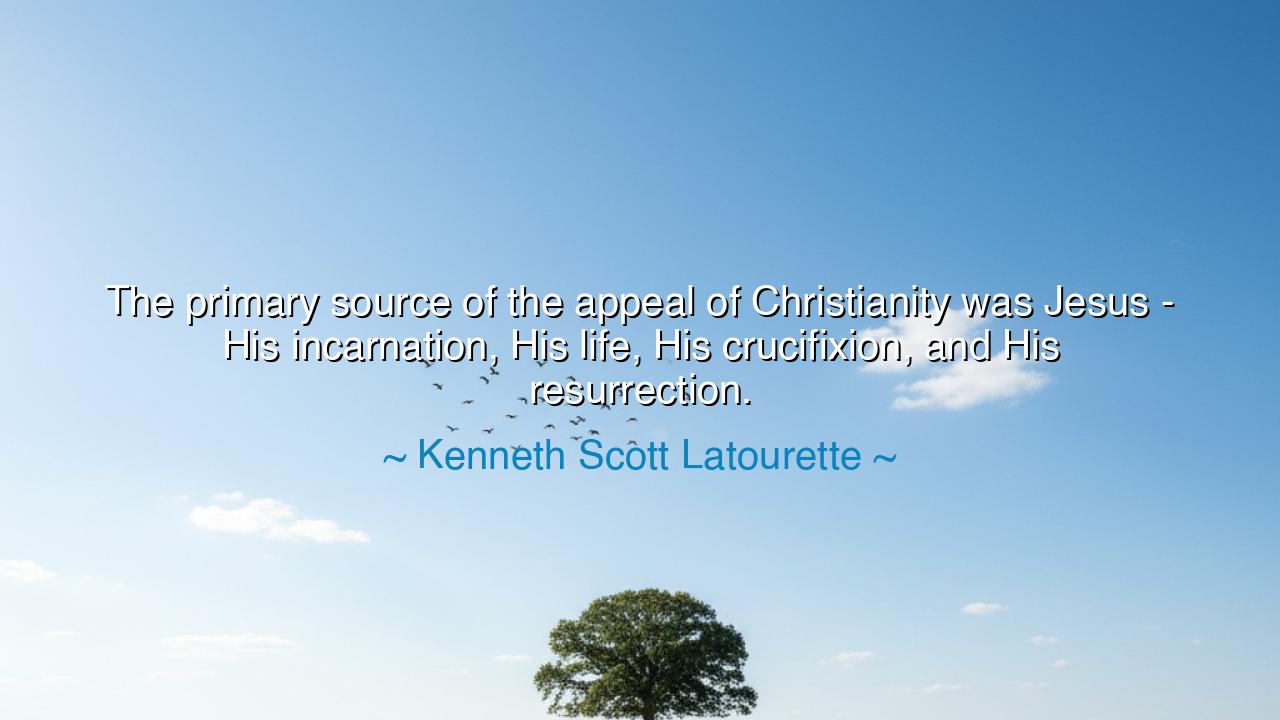
The primary source of the appeal of Christianity was Jesus - His
The primary source of the appeal of Christianity was Jesus - His incarnation, His life, His crucifixion, and His resurrection.






The words of Kenneth Scott Latourette — “The primary source of the appeal of Christianity was Jesus — His incarnation, His life, His crucifixion, and His resurrection” — strike like a bell that has rung through the centuries, clear and unwavering. They remind us that at the heart of the greatest spiritual movement in human history stands not a doctrine, not an institution, not even a book — but a person, radiant and living: Jesus Christ. Latourette, a historian of faith and civilization, sought to understand why Christianity, born in obscurity among fishermen and shepherds, came to transform empires and continents. His answer was simple and eternal — that the power of the faith did not lie in its followers, nor in its organization, but in the figure of Jesus Himself: His presence, His sacrifice, and His triumph over death.
To grasp this, we must look beyond theology and into the realm of the human heart. In the ancient world, religions were many and gods were countless. There were temples to wisdom, altars to war, shrines to pleasure and power. Yet into that world came one who claimed not merely to teach truth, but to embody it — who did not sit above men as a ruler, but walked among them as a friend. The incarnation — that divine mystery in which God took on flesh and dwelt among humanity — shattered the old barriers between heaven and earth. For the first time, divinity was seen in humility, power in service, and eternity in compassion. That is why, as Latourette writes, the appeal of Christianity begins here: with the astonishing claim that God Himself had entered the story of man.
The life of Jesus was unlike any the world had seen. He did not command armies, nor seek thrones; He touched the sick, blessed the outcast, and forgave His enemies. His strength lay in mercy, His authority in love. Every word He spoke carried a quiet fire that set hearts aflame, for He taught not from books, but from the living truth of His being. He revealed a kingdom not of borders and laws, but of spirit and grace — a kingdom where the poor were lifted, the sinners redeemed, and the forgotten restored. In this, His life became the greatest sermon ever lived, and the seed from which the tree of Christianity grew.
Then came the crucifixion — the moment when love descended into suffering, and the light of the world seemed to be extinguished by darkness. To the ancient mind, this was madness. Gods were immortal; heroes conquered. Yet here was one who saved others and would not save Himself. But this was the paradox that conquered the world: that the highest power is not domination, but self-sacrifice. Upon the cross, Jesus revealed a love so vast that it embraced even those who pierced Him. The cross, a symbol of shame, became the emblem of redemption, the bridge between the divine and the human. It was not through victory in battle, but through the triumph of forgiveness, that He transformed history forever.
And beyond the shadow of death came the dawn of the resurrection — the event that gave His followers courage to face lions, empires, and exile. The empty tomb was not merely proof of His divinity; it was the promise of renewal for all humanity. If death could not hold Him, then no grave, no sorrow, no sin could bind the human soul. This is what Latourette saw as the wellspring of Christianity’s enduring power. The message of the resurrection was not confined to time — it became a living hope, whispered from martyr to martyr, from saint to sinner, from mother to child: “He lives, and so shall we.”
We see this same power reflected in history’s great awakenings. Consider St. Francis of Assisi, who centuries after Christ’s death, heard anew the call of the Gospel and renounced all wealth to live in perfect imitation of his Lord. In his poverty and joy, men saw again the radiance of Jesus’ life. Or Harriet Tubman, who in the face of slavery drew courage from the story of the crucified Savior, believing that deliverance was God’s promise. In every age, those who encounter the living Christ — whether in Scripture, in service, or in suffering — rediscover the same appeal that Latourette described: the irresistible power of His person.
The lesson in this quote reaches beyond religion; it is a call to remember that transformation begins not with systems, but with souls — not with institutions, but with individuals who embody truth in action. The world is changed not by those who preach ideals, but by those who live them. As Christ’s incarnation brought heaven to earth, so too can every act of compassion bring light into darkness. To follow His example is to become, in our small measure, bearers of that same divine fire.
Therefore, let the words of Kenneth Scott Latourette echo in every heart: the true power of faith — of Christianity, and indeed of all good — lies in the life that is lived in love, the sacrifice that redeems, and the hope that endures beyond death. Let each soul who hears these words remember: the story of Jesus is not ancient history; it is the eternal heartbeat of humanity. And as long as men and women continue to live in the spirit of His life, His cross, and His resurrection, the world shall never cease to be reborn.






AAdministratorAdministrator
Welcome, honored guests. Please leave a comment, we will respond soon